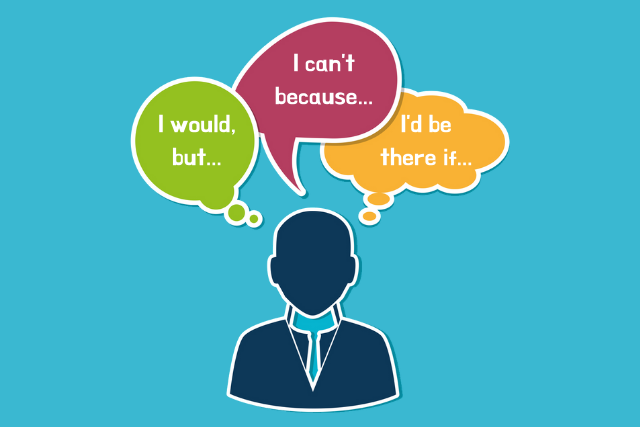
“Daring to set boundaries is about having the courage to love ourselves, even when we risk disappointing others.” ~Brené Brown
Saying no is difficult for me. Whether it be to a loved one or a stranger, work tasks or a new hobby, something I enjoy or despise, saying no just plain sucks. So instead I say yes. I say yes to everyone and everything until I’m left exhausted, depleted, and with nothing left to give.
When COVID quarantine kicked-in I was forced to clear my calendar. Appointments, gatherings, travel plans—all cancelled. Instead of feeling disappointed, I began to feel lighter. I now had a valid excuse to let go of my overbooked plans and was granted a socially acceptable reason to say no. For the first time in my life since I was a kid, I had space to just be.
As shelter-in-place restrictions began to lift, the calls and meeting invites began to pour in. Like a damn where the gates once held back the water, I was flooded with requests to do more—reconnect with loved ones, make delayed appointments, join charitable causes, start new projects.
I could feel the anxiety rising as I struggled to keep my calendar clear. I realized if I wanted to maintain space in my life, I had to learn the art of saying no, without the need for an excuse.
In a culture where being busy is the norm and worn as a badge of honor, it is especially difficult to maintain healthy space in our lives. But there is always an opportunity cost to everything we say yes to. When we say yes to everyone and everything, we say no to ourselves.
Why We Say Yes When We Want to Say No
People-pleasing
We want to make people happy and we do so by saying yes, even when it means sacrificing something that is important to us. However, it is near impossible to make others happy if they are dependent on us to provide it for them.
There is a fine balance between compromise and becoming a martyr. When we give up something that is important to us to the point of energy depletion, we will not bring happiness to anyone, especially not to ourselves.
Guilt
When we say yes because we feel a level of guilt, we may engage in activities and relationships that leave us feeling drained. Perhaps we say yes because we feel there is a certain level of expectation or obligation.
In some roles there are responsibilities that come with the territory, such as in parenting or as an employee; however, that does not mean saying yes to every demand. The more we say yes out of guilt, the more energy is sapped from our being and we begin to develop underlying resentment toward the person or activity asking us for attention.
Fear
So often we move from a place of fear and are not even aware it is our driving force, all the while it lies under the surface wreaking havoc on our life.
Buried deep within us is the universal fear that we are not enough. So we overcompensate—doing more, acquiring more, saying yes to everyone and everything. We people please in order to make people like us. We stay in toxic relationships because we fear being alone. We say yes because we are afraid of missing out on an opportunity. Of being less than. This fear of course, is an illusion.
How to Learn the Art of Saying No
Identify your core values.
What are those values that align with your core and help you feel connected to your purpose? What it is that you really want to make space for in your life?
Take time to meditate on what these values are—quality time with family, work life balance, being present, being of service. If quality time with your family is most important to you, yet you say yes to every work opportunity that comes your way, then you are likely out of alignment. Before saying yes to any new commitment, take time to evaluate whether it aligns with your core values.
Plan for space.
The challenge with scheduling plans is that our calendar is fixed while our energy levels are variable. How can we anticipate how we will feel two months from now? How do we know what new opportunities and needs may arise in the future?
Avoid making plans you can’t keep and do not overbook yourself. For example, if you already have plans to spend with your parents on Saturday, don’t try to squeeze in a visit with your friend the same day. Or plan one weekend a month to do nothing. Leave it open. Perhaps you will use the time to catch up on lost sleep or work in the garden, or maybe a spontaneous afternoon hike with a friend. When we make time for space we allow life to flow naturally.
Listen to your body.
If we push ourselves to the point of exhaustion it is inevitable that our body will start to rebel. Headaches, muscle pain, digestive troubles, rashes, these are all ways the body communicates to us we are taking on too much. When I am stressed from too much doing, I inevitably break out in hives. Or my body stores the tension in my shoulders to the point where my hands go numb.
The body does not lie. So take time to tune into what your body is telling you. Often it means more rest and self-care.
Follow your intuition.
We each have the ability to tune into our intuition, that gut feeling we get in our stomach when something doesn’t feel right.
One time I had a trip planned to San Diego to visit a friend. As the trip grew closer, something within myself told me not to go. I talked to my friend about my concerns and they were so disappointed that I decided to go just to make them happy.
The trip of course ended up a disaster. Not only was I resentful for feeling like I had to be there, but my son ended up with a severe allergic reaction to poison oak and I had to fly home early to be with him. Our intuition is powerful. Follow it.
Stop making excuses and apologizing.
Whenever I say no I find myself following up with several different excuses as to why I have to decline. The truth often is just that I’m tired. Or I would rather not. Or it doesn’t align with where I want my energy to go at this time.
I recently got an adorable puppy, Scout, who requires full attention and more time at home. I have said no more over the past two weeks since I have brought him home than I have over the course of the past year.
You don’t have to get a puppy to exercise your voice of saying no. You don’t need an excuse. There’s nothing wrong with being honest and saying, “I’m carving more space for being present in my life, which requires me to make fewer plans.”
Pay attention to your physical space.
Look around the space where you live and spend your time. Is it full of clutter? Your physical space reflects your internal space. My family in particular loves to hand down things to me, and since I have a hard time saying no I end up acquiring way more than I need. Take time to clear out your closet and junk drawers. Practice saying no to things and letting go of what you no longer need. See how much lighter you feel.
See yourself in the eyes of another.
I had a boyfriend once who refused to make any plans. Every time I asked him to make plans, he gave me the response “I’m not sure I will have the energy, let’s play it by ear” or “I’ll let you know as the date grows closer.”
This drove me crazy. Why? Because I had an expectation from him to prioritize me. To make me happy. All he was doing was setting his personal boundaries. Instead of recognizing our priorities were out of alignment, I grew resentful, hurt, offended.
When I reflect back on this relationship, I see he was a teacher for me. I began to recognize my own resistance to others’ boundaries because I lacked my own.
Accept that others will be disappointed.
Just as we are not responsible for people’s happiness, we are also not responsible for their disappointment when we exercise the art of saying no. Accept that inevitably when you set boundaries with your time and energy someone is going to be disappointed. That is just the tradeoff we face. Be assertive and honest. If they don’t understand when you honestly share your truth and communicate your own needs, then that says more about where they are anything.
—
To learn the art of saying no, the first step is awareness. Give yourself time to check in with yourself before giving a response.
Does what is being asked of you align with your core values? Pay attention to how your body feels. What does your intuition tell you? Evaluate opportunity costs, what are you giving up by saying yes? Do you have space around your commitments? Are you being honest with others and yourself in your response?
These are the questions you may begin to ask yourself. From awareness it takes consistent practice. It may feel uncomfortable at first, but the more we say no to the things that are not in our highest interest, the more space we make for saying yes to those things that matter most.
About Shannon Leigh
Shannon Leigh is a student and creator of life. She is here to learn and share experiences with others through the practice of yoga. She believes yoga brings us back to our most authentic self, and the best way we can be a light for others is to cultivate self-love and acceptance. From unconditional love the magic of our lives can unfold in the most beautiful ways. Visit her at beloveleigh.com.













 Though I run this site, it is not mine. It's ours. It's not about me. It's about us. Your stories and your wisdom are just as meaningful as mine.
Though I run this site, it is not mine. It's ours. It's not about me. It's about us. Your stories and your wisdom are just as meaningful as mine. 